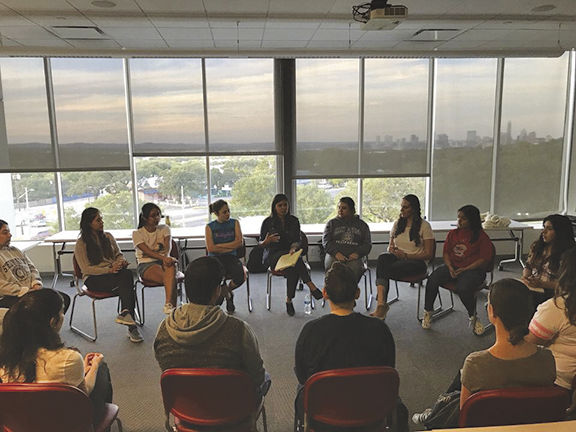Latinx discussion ‘takes care’ of mental health

The discussion honed in on ways to maintain mental health in the Latino community
Latino Student Leaders Organization (LSLO) recently held their program on mental health for Latino students, “Cuidate: Mental Health & Self Care in the Latinx Community.”
The event provided a space for Latinx students to discuss the current political climate, natural disasters, everyday stressors and the effect of these issues on students’ mental health. “Cuidate” which means “take care” was used by LSLO to demonstrate their objective: providing coping mechanisms for Latinx students.
“This event was held to give Latinx members a space to vent out their emotions and learn about the resources we have here,” said Kelly Aparacio, Vice President of LSLO.
The function welcomed a discussion supported by Julia Zenteno Montez, a psychologist from the Health and Counseling Center. Montez began with a check-in, discussing current stressors for LSLO members.
“It’s important to take care of yourselves, especially with the polarizing political climate,” Montez said.
When operating on higher levels of stress, Montez suggested seeking and utilizing the supportive resources St. Edward’s has to offer. “I come from a traditional Latino background, so I know it is not something that is done in our families,” Montez said.
According to Sara Villanueva, professor of Psychology at the School of Behavioral and Social Sciences, collectivist communities are often hesitant to make individual assessments of personal health.
“We come from a collectivist background,” Professor Villanueva said. “I’ll check up on you, you check up on me, but not everyone gets that.”
The program set-up three stations for their group attendants to visit throughout the night. The stations included one on gratitude, another on meditation and the last a six word memoir station. At each, members were asked to complete tasks to build helpful coping mechanisms for stress.
Members of the LSLO community disclosed their personal relation the stigma of discussing mental health in the Latino community.
Aparacio shared her experience with counseling, stating that “Growing up Latino, mental health is something that gets pushed under the rug. In my experience I took the chance of going into therapy, and took advantage of my resources here at St. Edward’s.”
Aparacio also mentioned that, “Mental health issues are just more common here with the political climate, the natural disasters, and just the stress of being a student.”
Another LSLO member and holder of the Government Relations Chair Alejandro Izagiurre discussed his own struggle with discussing mental health with his family.
“My parents say, ‘Que es la depression? Tienes una casa, tienes comida, tienes una familia.’ It’s like the three essential things that you need. Why would you create problems within yourself to stop you from doing things,’” Izagiurre said.
Izagiurre shared how often Latino parents fail to understand the issues first-generation students encounter when making sense of cultural differences.
“My mom and dad are both very resilient people. They have the mindset of pushing forward and getting through whatever you need to get through and that your mental health should not really effect your actions,” Izagiurre said. “If you work hard you can get what you want. They identified that as stability and never recognized depression as an actual issue. “
LSLO members recognized a disconnect between the American individualist mentality and their collectivist upbringings.






